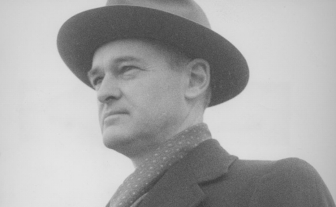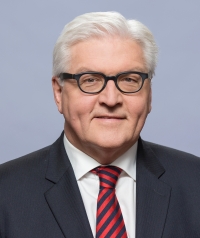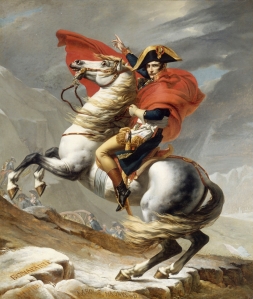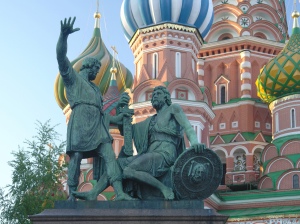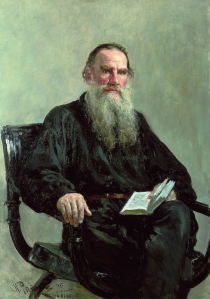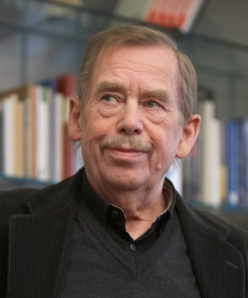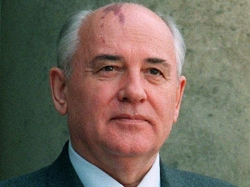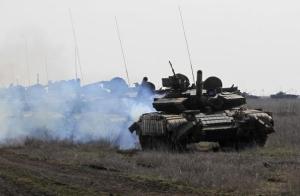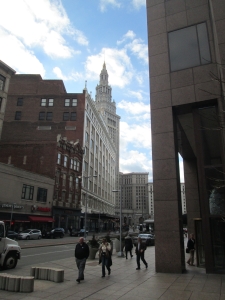
Terminal Tower, Downtown Cleveland (Photograph by this writer)
In the aftermath of the 2016 presidential election, the American media has been in a state of panic over allegations of Russian hacking. The frenzy has been promoted by war hawks in both major parties, bolstering their bellicosity.
But what do average Americans really think of the Russians?
To answer this question, I set out on a journey through two cities in the American Rust Belt state of Ohio: Cleveland and Columbus.
My mission was to go diners, bars, construction sites, barber shops, and hair salons and talk to working Americans about the Russians. Overall, I interviewed over 30 persons of various professions. I took copious notes, with the permission of all my respondents. The only people who declined did so because they did not have the time. All interviewees were anxious to respond, some to the point of interrupting others. The answers that I received were far more nuanced than one might expect.
Searching for the Russian trace in Cleveland
Home to large communities of Eastern Europeans and post-Soviet peoples, the city of Cleveland is no stranger to the Russians. In the 1930s, celebrated Soviet satirists Ilf and Petrov scrambled to find directions to the city. In the 1950s, Anastas Mikoyan visited the city as part of a larger tour of the US. Upon catching sight of Cleveland’s Terminal Tower, tears reportedly came to Mikoyan’s eyes as he recalled a familiar landmark from home: the Lomonosov Moscow State University.
“Reporters who stood close to him as he looked at the downtown skyline swear that the old Communist’s mustache twitched,” wrote Massachusetts-born Cleveland journalist George E. Condon. “His eyes were misty as he raised an arm in comradely approbation and said: ‘Now you’re talking! This is my kind of town!’”
My first stop in Cleveland was the Clevelander Bar & Grill in the city’s downtown on 27 December 2016. After ordering a beer, I asked the people behind the bar about the Russians.
“Can we get along with them?” I inquired.
“Look, if there was a war or something, I would want Russia on my side,” said the bartender, “They’re big and tough, man. Who was the guy who led them during the war? You know, with the mustache?”
“You mean Stalin?”
“Yeah. He was tough, man.”
“What do you think?” I asked the barmaid.
“Of course, we should have them as our allies,” she said. “We need to have a dialogue with them, but I don’t trust them. You know what they say: keep your friends close, but your enemies closer. Still, I don’t trust Russia. It’s a very scary country.”
“Why do you think Russia is scary?” I asked.
“I dunno. That’s what the media says,” she responded. “However, I don’t think the people are bad. Our neighbor is a Russian. He’s married to a Serbian woman. We have no problems with them. In general, I think that people can get along. The governments can’t. That’s the problem.”
Later, I walked down the street to a Subway restaurant. After ordering a sandwich, I casually began a conversation about the Russians with the owner and his assistant, both middle-aged, round and jovial African-American men.
“The Russians are tough,” said one of the men. “They mean business. You don’t wanna mess with them, man.”
“Do you think that US-Russian relations can improve?”
“Not while Donald Trump is in the White House,” he chuckled heartily. “That man’s crazy! He can’t even keep his Twitter under control! How can we expect him to deal with the Russians?”
Walking back, I traveled to the old beaux arts Leader Building on Superior Avenue. The building is under construction, being converted into condos. This was a perfect place to continue inquiries about the Russians. I found a group of affable construction workers on their break. The men were middle-aged. Three were white, one was black.
“Can we get along with the Russians?” I asked.
“Why not?” said the black construction worker, smiling easily. “We need them.”
“We do need them,” said another construction worker smoking a cigarette, “I mean, look how big their country is! They’re a lot of people. We need as many people to be our friends as possible. We don’t need anymore enemies. You know, my neighbors are Russian immigrants. I have no problems with them. Honestly, I think conflict now between the two governments is basically one big pissing match. If you just bring the people together and leave the politicians out of it, then we’d be fine.”
“I know the authors Dostoevsky and Bulgakov,” interjected another worker. “Crime and Punishment and The Master and the Margarita are among my favorite novels. If Russians can write such great novels, then they must not be bad people. We can work with them.”
I continued to the Starbucks in the Huntington Bank (formerly Sohio) Building. What did the baristas of this corporate coffee chain think when they thought of US-Russian relations?
One barista, a tall young man in Buddy Holly-style glasses who was, ironically, of partial Russian descent, responded:
Well, for one thing, the Russians are people you don’t wanna mess with. Ultimately, it depends on the leadership on both sides. I feel that any American leader needs to approach the Russians with a lot of tact and finesse, but also toughness. Putin’s a smart guy. At times he can be unpredictable, like what he did in Crimea. However, he’s not crazy like Ahmadinejad or the guy in North Korea. He knows his stuff and he’s tough too.
Can relations improve? Ideally, absolutely. Yes, the interests of the US and Russia do usually differ, but I think we can find common ground. Trump said he’d be willing to talk to the Russians. Some people might not agree, but I honestly think that it’s movement in the right direction. Look, we’re dealing with two nuclear-armed countries here. No one wants war. Why not talk instead?
Another barista, a pretty young woman, also of partial Russian descent, interjected:
I agree. We could and definitely should get along with the Russians. In fact, we can get along with a lot more countries than we do now. However, in order for that to happen, I honestly think that we need to stop getting involved in everybody else’s business. We need to move beyond the idea of American exceptionalism. Right now, it seems as if everybody is angry at us.
“Buddy Holly” nodded, adding:
Right. We need to talk to countries more. We have to stop all these wars. We need to get our own house in order. We don’t need to import democracy to other countries. They need to learn it on their own.
Like everybody is now talking about these Russian hacks. But didn’t we interfere in their politics? Honestly, I don’t buy the whole story. For one thing, there’s just no proof. It just seems like a way to discredit Trump before he enters the White House. It’s dangerous, though, because these accusations involve a nuclear-armed country.
Founded in 1893, Otto Moser’s is a Cleveland institution. Located in the heart of Playhouse Square, Cleveland’s theatre district, the deli is renowned for its corned beef sandwiches. It has also been the frequent hub for visiting stage actors and movie stars. Bob Hope, Helen Hayes, W.C. Fields, Fanny Brice, the Barrymores, and John Philip Sousa all dined at this celebrated restaurant. It was the next stop in my quest to discover what average Americans really thought of the Russians.
Sitting at the bar, I ordered a drink and quickly began a conversation with the waitress, a middle-aged Greek-American lady. As it turned out, she was actually married to a Russian, not surprising in a town where onion-domed Orthodox cathedrals are a common sight. She said:
You know, there are people who still think of the Russians as communists. However, the fact is that they’re not. In fact, they’re trying to move away from all that. What Stalin did was incomprehensible. The Orthodox Church was heavily persecuted in the Soviet Union. You know, I’m Greek and Orthodox and my husband is Russian and Orthodox. When he came to this country, he literally had to re-learn Orthodoxy.
Could the US and Russia get along?
“Well, I sure hope so,” she said. “It’d be better than the alternative.”
Another waitress, an older woman, spoke-up and claimed that she was of Russian descent and that her family was descended from nobility who had fled the 1917 Revolution. She added:
To be frank, I doubt that Putin and Trump are in cahoots. I mean, it’s possible that the Russians did hack the election, but I honestly don’t believe it. If they did, then what’s the big deal? People forget that we influenced their elections! As to the question of us getting along with the Russians, of course we can. We have a long history with Russia, not all of it bad. In general, we should have good relations with all countries. After this election, we seriously need to think about uniting our own country here at home and not get involved in fighting wars overseas.
As she spoke, it began gently snowing outside. A middle-aged African-American gentleman in a fleece who was sitting next to me joined in on the conversation. He was a tall, easygoing, plain-spoken man. A fan of the Buffalo Bulls and a Cleveland native, he was a small business owner and spent much of his time between Cleveland and Washington, D.C.
“What do you think of the Russians?,” I asked. He responded:
I look at the Russians as Russians. We need to see the humanness of the other side, you know what I’m sayin’? That’s how you start makin’ peace between people. Now, the relations between our governments, that’s a different issue. That’s political. Sometimes I think that we can never get along, but you know, we now have a new president in office. He says he’ll fix the relationship. Let’s see what happens.
“What do you think about the allegations of Russia hacking the DNC?”
I don’t buy it, honestly. In general, I don’t trust anything the media or the pundits say. Is there a possibility that the Russians did hack the election? Sure. But honestly, I don’t believe it. Even if they did, it wouldn’t have had a decisive impact on the outcome.
A hair stylist, a middle-aged woman of Syrian Christian background, at Best Cuts in the old Cleveland “streetcar suburb” of Lakewood, echoed this sentiment:
I think we have a chance to get along with the Russians now that we have a new president. I think Trump’s going to work on it. Will he succeed? I don’t know. But I think that the two superpowers should definitely be talking. Russia is a powerful, nuclear-armed country. You want them to be on your side, especially because there are so many issues that both of our countries could cooperate on. Take Syria. As a Syrian, I can tell you we don’t want Assad out. If Assad goes, ISIS will be in Damascus. I definitely think Syria would be more stable with Assad in.
As for the Russian hacking allegations, I certainly wouldn’t put it past them. However, I think Hillary’s people cooked up the whole thing to discredit Trump.
Pursuing the Russian trail in Columbus
I continued my quest for answers in Columbus, the capital of Ohio, again, taking notes as the respondents spoke. On the morning of 10 January 2017, I had breakfast at the Hangovereasy, a popular diner in Columbus, especially among university students. At the bar, I ordered a cup of coffee and struck up a conversation with the bartender, a big, bearded middle-aged man of mixed German-Greek descent with an easygoing demeanor. I asked him: Can we get along with Russia? He responded while cashing out an order at the register:
Why not get along? I know that the war hawks don’t want any cooperation with the Russians. But honestly, we need to get along with them. After all, they’re a large country with nuclear weapons.
I also think that if more people actually got to know actual Russians, then things would calm down. I knew Russians when I used to work out in LA. They’re good people, man. I mean, I never saw them as ‘enemies.’ They never were rude or demanding or anything like that. They ran this wonderful Russian coffee shop. They actually reminded me of people from the Middle East. Like, you know Lebanese or Syrian immigrants. Very good, entrepreneurial people.
They’re very generous too. You know, this one Russian guy in LA actually gave me a complete Bose stereo set. Just gave ‘em to me, man! They were sweet, but, in the end, I had to sell them in order to move back to Ohio with my girlfriend. So, yeah, I think if there was more interaction between Russians and Americans as people, things would get much better.
You know, there’s a lot of fear going around now, especially now with all these stories you see in the media about the Russian hacks. Honestly, I think it’s all BS. I mean, the Russians could have influenced the election, but even if they did, I doubt they determined it. I think it was all made-up by the Hillary faction of the Democrats. They’re just sore losers and have a hard time accepting the results. Hey, when you screw over working people and rig the election against Bernie, that’s what you get. I’m sorry. You know how it is here in Ohio. Our jobs have been shipped overseas. And they just expect us to vote for them? I don’t think so.
And you know what? There’s fear on the other side too. My Russian friends in LA once told me that, back in Russia, all the news stories about the US were about war. Now, that could be because the government influences the media, but it also could be because we’re involved in so many wars overseas. We really need to start worrying about our own problems in this country and drop the “I’m #1” mentality that gets us into all these wars.
After breakfast, I walked to a nearby construction site on the OSU campus. Here I encountered a group of workers on break. What did they think of the Russians?
“We have to deal with them,” said one of them. “They’re a big superpower with nuclear weapons. That’s the reality. Yeah, I know they’re talking about all these hacking stories about the Russians. Honestly, I don’t believe it. I think it’s the media trying to make Trump look bad. And I don’t know what our trade with Russia is like, but we need good trade deals in this country that benefit American workers, not corporate interests.”
“I’m in favor of any relationship that’s mutually beneficial,” said another worker, the equipment manager. He was an older gentleman with a thick grayish beard. “Maybe Russia’s got something that we want. Maybe we’ve got something that the Russians want. I’m all for trade and exchange, but it’s also gotta be fair and equal. We have too much unequal trade. Ohio jobs have been shipped overseas. You go to the store and everything is made in China, Taiwan, Mexico, or other countries. It used to be made in the US!”
“What do you think of the Russian hacking allegations?,” I asked.
“I think it’s a bunch of BS,” the man said as he smiled with a twitch of his thick mustache. “There’s no proof. It’s just one party wanting to get revenge on the other party.”
My final stop in Columbus was Adriatico’s Pizza. Established in 1986, it is one of the most renowned pizza places in Columbus. I posed my question to the waitresses: can we get along with the Russians?
“It depends who the leadership is,” responded one of the waitresses. “Honestly, I think Putin is conning Trump. I mean, sure, it makes sense to have good relations and it is possible, but I think the Russians are playing games with us. I’m not sure what’s driving these recent tensions – nuclear weapons or oil.”
“I don’t see why we can’t get along,” interrupted another waitress. “Look, we don’t see eye-to-eye with the Russians on everything, but you know the adage ‘keep your friends close, keep your enemies closer.’ We need to talk to them even if we disagree. Who knows? Perhaps we can become friends on some issues. We don’t want more enemies. I know that there are politicians in Washington who want more war, but I don’t.”
“I doubt we can have good relations,” said a third waitress. “We have different values. Our governments are completely opposite. For one thing, the Russians are tough and mean. They’ve become hardened by communism and World War II. Now they’re hacking into our elections. Trump was involved in that. After all, he’s friends with Putin.”
“Do you know that for a fact?”
“I dunno. That’s what they said on TV.”
Finally, I spoke to one of the head managers of Adriatico’s, a slim gentleman of 40 years with jet black hair. Could we get along, I asked? He responded:
Optimistically, yeah, I think we can get along. I mean we’re dealing with two nuclear superpowers here who can destroy the earth many times over. And yes, Russia is a superpower. They had their falling off for a little bit there, but now they’re back. We have to accept that reality.
I remember when I was a kid 33 years ago and I watched The Day After on TV with my folks. This was up in my hometown of Tiffin, Ohio. We were a blue-collar family. My dad worked for a foundry. But man, I’ll never forget The Day After. Now that was scary! I mean, what are you? 25, 28 years-old? You don’t know what it was like in 1983. It was really scary. And The Day After was almost real, that’s what made it even scarier. I remember it being late at night, later than my usual bedtime, and watching the mushroom cloud on TV. I’ll never forget that mushroom cloud. I couldn’t even finish watching it.
Now, look, I’m a 40-year-old man. I have a four-year-old son. I don’t want him to grow-up in fear. And, look, from what I understand, we’ve got fear on both sides. Okay, so Americans think Russia is scary, but aren’t the Russians also afraid of us? I’d rather believe in a global society, where the US can talk with all countries – especially Russia.


